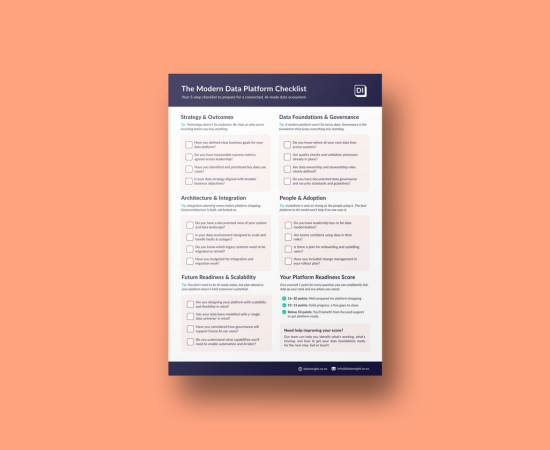As the new year approaches, it's time for businesses to set data-driven resolutions that will drive both growth and innovation.
The data you collect is more than just numbers—it's the cornerstone of understanding your customers, your operations, and the heartbeat of your business.
With the smart use of data analytics and artificial intelligence (AI), any business can become more insightful and data-savvy.
Here are ten data-driven resolutions that every business should consider:
1. Develop a data strategy
The journey to becoming a data-driven business starts with a clear map — your data strategy. This means working out how data is going to support your company goals.
It's about ensuring everything you do with your data delivers value to your business objectives, ensuring every choice you make is informed by relevant and useful data.
2. Enhance your data security and governance
Your business information is precious. Just like you lock your doors at night, make sure your digital information is protected too. In an age where data breaches are all too common, strengthening data governance and security is critical.
This involves implementing robust compliance and governance practices, ensuring your business adheres to legal standards and ethical guidelines for data handling. It's about establishing clear policies and procedures to safeguard your data against unauthorised access and ensuring your team understands and follows these guidelines to the letter.
3. Embrace data literacy in your team
Data literacy has become as essential as computer literacy for any forward-thinking business. Dedicate 2024 to enhancing your understanding of data, starting with the basics like interpreting reports from your sales software.
Consider investing in Power BI training and other educational resources. This effort will empower you and your team to make more informed decisions, recognise significant patterns, and engage effectively with your data.
It's especially vital to grasp the nuances of artificial intelligence and its practical applications within your industry. A team well-versed in data literacy is an invaluable asset in navigating the complexities of today's business landscape.
4. Use data to predict and plan
Think of advanced analytics like a weather forecast for your business. By integrating artificial intelligence and machine learning models, businesses can predict trends, automate complex processes, and foresee what your customers will want so you can plan accordingly.
It's about getting ahead of the game and making proactive decisions that can lead to a competitive advantage.
5. Make sure your data is accurate
Good decisions need good data. An occasional data audit check-up ensures your info is accurate and up-to-date. Think of it as a thorough cleaning and organizing of your business data to avoid costly mistakes and misinformed decisions.
Go a step further by prioritising data governance, to ensure data hygiene, maintain data quality, and build trust in data in your business.
6. Create a team of data champions
Shift your business towards decisions based on data, not just gut feelings. Encourage your team to embrace easy-to-use tools and interactive dashboards. This helps integrate data analysis into daily routines, ensuring decisions are backed by facts.
A data-driven culture means every team member becomes a part of the informed, strategic decision-making process in your company.
7. Know your customers inside out
Build a complete picture of your customers by combining data from various sources into a single customer view. Use customer behavior analytics to understand their preferences and needs.
This holistic approach enables you to personalise experiences, anticipate desires, and strengthen relationships, leading to greater satisfaction and customer lifetime value.
8. Tell stories with your data
Good data reporting is like storytelling – it should be clear and engaging. Develop more effective and automated reporting with tools like Power BI, which can turn rows of data into a clearstory that everyone in your company can understand and act on.
This can help to create a data-driven culture within your business, allowing team members at all levels to draw insights and make informed contributions.
9. Streamline your day-to-day
Apply advanced analytics, artificial intelligence (AI), and automation to optimise your operations. From managing inventory with predictive analytics to improving logistics through trend analysis, use your data for operational efficiency.
10. Set clear, trackable goals
Decide what you want to achieve with your data. It could be getting more customers, selling more products, or reducing costs.
Whatever it is, having clear goals will help you stay focused!
By setting these straightforward resolutions, you can start making more informed decisions that help your business grow. You don’t need to be a tech expert to get started—just a desire to understand your business better.
And if you find yourself needing guidance or support in achieving these data-driven New Year's resolutions, know that we are here to help.
Let's work together to make 2024 a year of remarkable achievements with a data-focused approach.








.png)